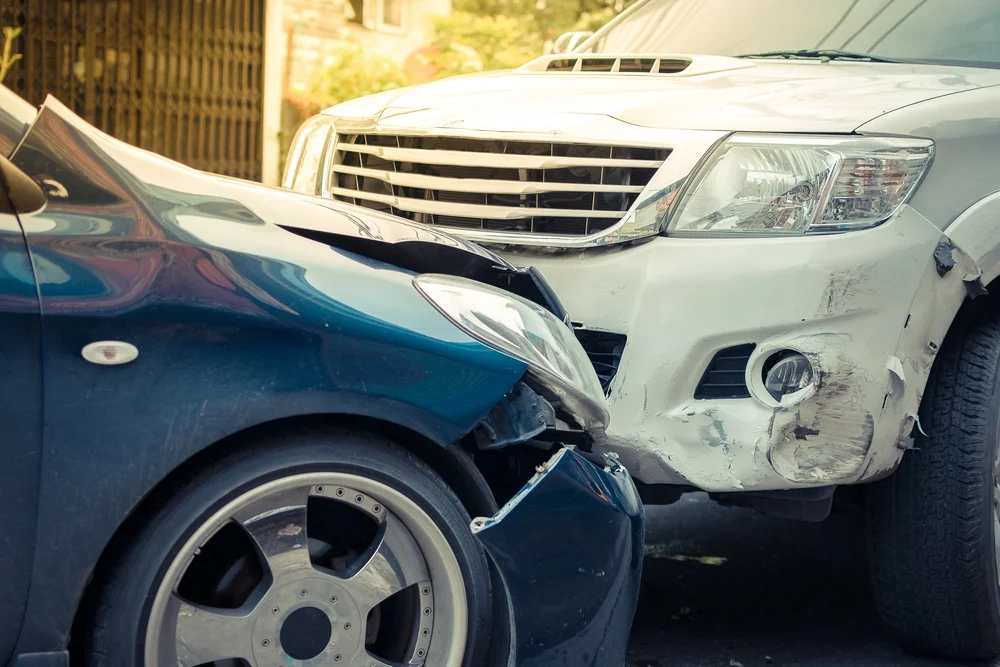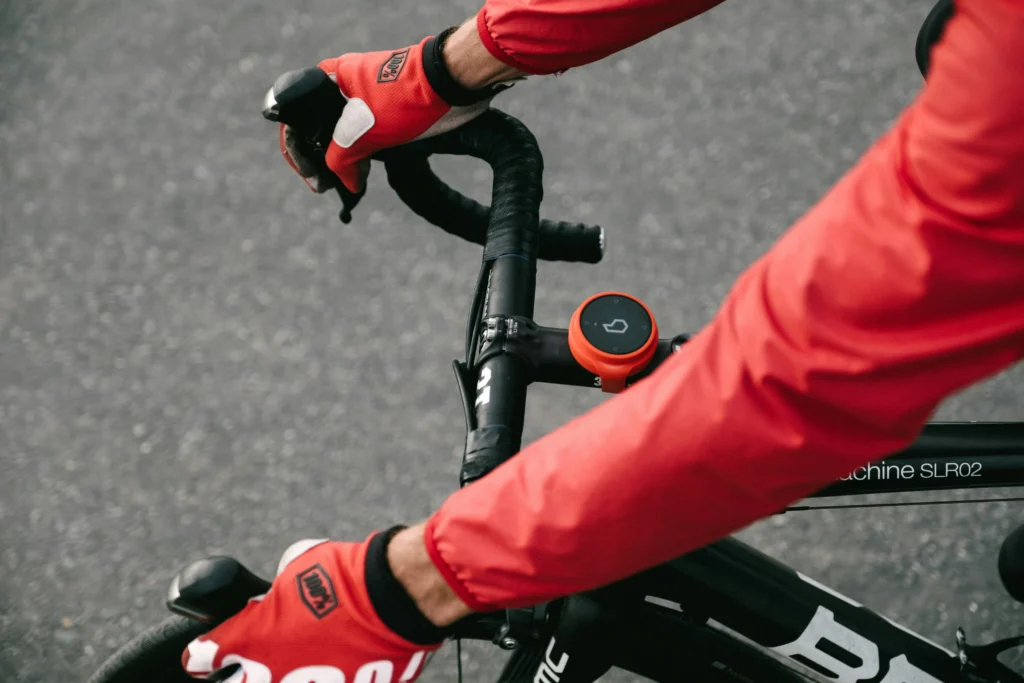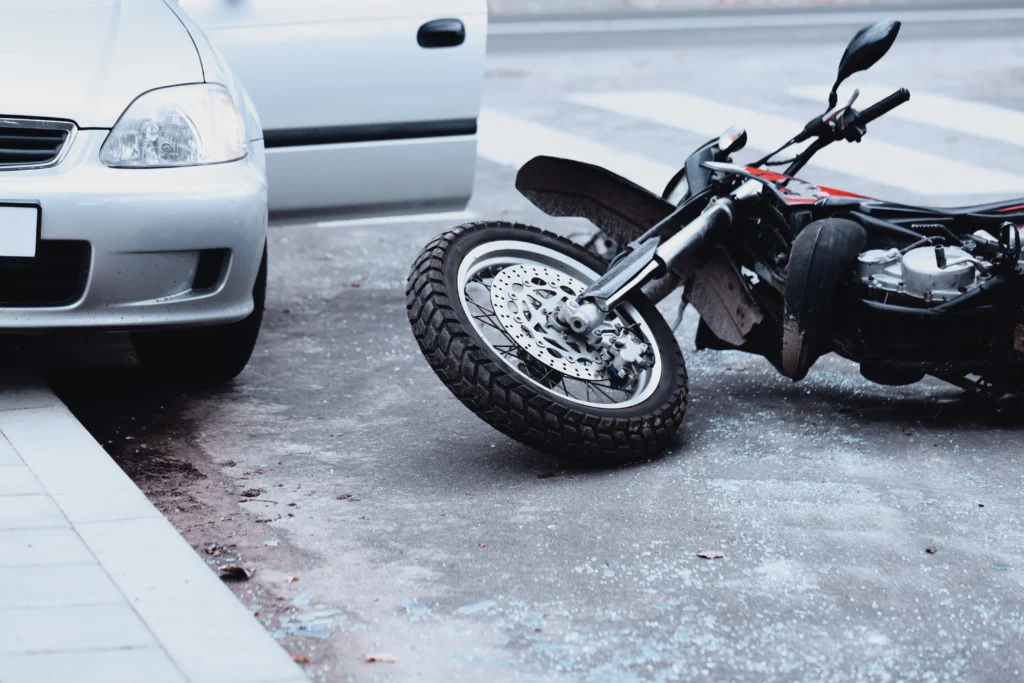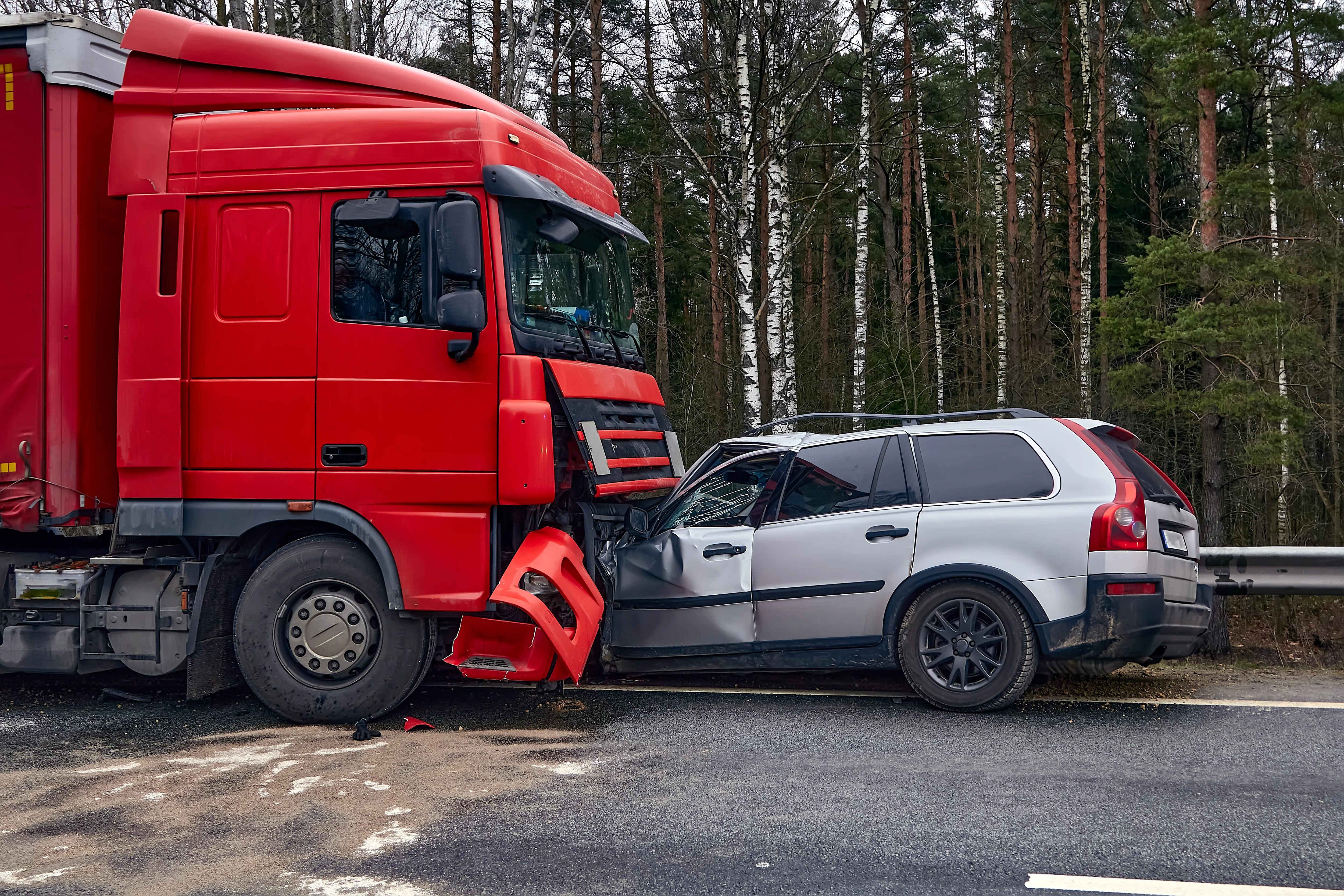Legal Help After a Washington 18 Wheeler Collision – Bernard Law Group
When an 18 wheeler collides with a smaller vehicle on a Washington highway, the result is often catastrophic. Victims face life-changing injuries, massive medical bills, and insurance companies that move quickly to deny responsibility. At Bernard Law Group, we’ve helped injured clients across Washington recover over $500 million by holding trucking companies accountable for preventable crashes.
Semi crashes account for thousands of injuries annually on Washington’s most dangerous corridors, I-5 through Tacoma, I-90 over Snoqualmie Pass, and SR-167 near Kent. Large trucks are implicated in nearly 5,000 fatal crashes nationwide each year, according to the Federal Motor Carrier Safety Administration. In the majority of those crashes, the trucking company or their driver violated safety laws.
Our staff acts fast. We secure truck log books, black box data, and highway camera footage before they disappear. We do not let freight carriers or their insurance providers stall, delay, or lowball your recovery. From Seattle to Spokane, we advocate for individuals harmed by freight haulers, semi-trailers, and big rigs carrying cargo through Washington.
If you have been hit by a commercial truck anywhere in the state, call us today at 206-752-2233 for a free consultation. No attorney fees are charged unless we win.
Evidence We Collect After a Washington 18 Wheeler Accident
In a Washington 18 wheeler crash, immediate evidence collection often decides the outcome. Commercial trucking companies move fast after a wreck, deploying legal teams and insurance agents to protect their own interests. That is why victims need a legal team that knows how to counter those tactics, gather the right documentation, and lock down every piece of proof before it disappears.
At Bernard Law Group, we begin collecting evidence within hours of your call. Our team investigates the crash location, obtains official records, and pursues digital evidence from the truck and the companies involved. The more we uncover, the more pressure we apply on freight carriers and their insurers. Whether the wreck happened near Renton, Yakima, or the I-5 corridor, we build the foundation for a strong legal case by securing evidence that speaks for itself.
Truck Control Modules and Black Box Systems Show Fault Clearly
The vast majority of 18 wheelers traveling through Washington are equipped with event data recorders and electronic logging devices. These systems track vehicle speed, hard braking, lane position, and driver activity in real time. That digital trail gives us proof of what happened in the seconds before a crash.
Why Black Box Data Is a Priority in Semi-Truck Claims
Black box data can reveal if a truck driver was speeding through Tacoma or failed to brake near the Tri-Cities. It captures the vehicle’s mechanical movements and inputs, even when the driver cannot remember the details. According to the National Highway Traffic Safety Administration, this data is vital in identifying crash dynamics and mechanical failure.
We act quickly to prevent data tampering or deletion. We send legal preservation demands and request full downloads of the truck’s event recorders before the engine is restarted or systems are wiped.
Traffic Cameras and Private Security Footage Capture the Crash Clearly
Across the state, local agencies and businesses use surveillance systems that monitor major highways, urban intersections, and parking zones. These cameras often catch the exact moment an 18 wheeler collides with a car or crosses the center line on a rural highway.
How We Identify and Preserve Visual Evidence Across Washington
Our legal team identifies nearby traffic cams and private security systems using crash location data and mapping tools. We contact business owners, public records offices, and local municipalities to request footage before it is overwritten.
In King County, we preserved gas station security video that showed a semi-truck running a red light. That single file changed the entire negotiation process. Visual evidence often confirms negligence in ways written statements cannot.
Dashcams and Residential Video Add Valuable Angles
More Washington drivers use dashboard cameras than ever before. In many 18 wheeler injury cases, victims or witnesses have dashcam video that captures unsafe truck behavior seconds before impact.
We also investigate neighborhood and business zones near the wreck. Doorbell cameras, warehouse systems, and parking lot feeds often provide secondary angles that validate the primary crash footage.
Maintenance Logs and Inspection Records Show Preventable Defects
Trucking companies are required by federal law to maintain their vehicles and conduct regular inspections. When they skip maintenance or delay repairs, they put everyone on the road at risk.
We Uncover the Condition of the Truck Before the Crash
We obtain vehicle inspection reports, brake service logs, tire replacement records, and driver pre-trip checklists. These documents help prove when the 18 wheeler was last serviced and whether the truck was in safe working condition at the time of the wreck.
Company Negligence Becomes Clear in Poor Documentation
When a trucking company cannot produce consistent maintenance logs or ignores federal vehicle upkeep regulations, we use that gap as proof of negligence. In many cases, poor fleet upkeep directly contributes to avoidable crashes across Washington.
Driver Records and Safety Histories Help Build a Stronger Case
Every commercial truck operator is required to maintain a clean driving record, complete regular drug testing, and meet ongoing safety compliance requirements. We request those records to identify any history of violations, unsafe conduct, or incomplete training.
We Track the Driver’s History Across States and Employers
Our team digs into the driver’s Motor Carrier Safety Administration file, Department of Licensing history, and company training records. When a truck driver has a prior crash history, prior drug test failures, or a suspended license, we present that to insurers and juries.
In one case involving a Washington 18 wheeler collision, we uncovered a history of reckless driving violations that the carrier ignored during hiring. That discovery raised the settlement value significantly and exposed deeper company-level failures.
Witness Statements and Law Enforcement Reports Add Independent Verification
Independent testimony remains one of the most powerful tools in any injury case. Eyewitnesses help fill the timeline, explain how the truck moved before the crash, and confirm dangerous behaviors such as tailgating, drifting, or speeding.
We Record and Preserve Testimony Early in the Case
Witnesses forget fast, especially in high-speed, high-trauma incidents. That is why we send investigators to record their accounts within days. We also request incident reports and collision diagrams from local and state law enforcement agencies across Washington.
These documents support our claims and often contradict the trucking company’s version of events. Law enforcement reports, paired with expert-supported timelines, give your case the credibility it needs.
Accident Reconstruction Helps Prove How the Crash Happened
Not every truck crash is straightforward. In rollover, jackknife, or multi-vehicle collisions, it can take expert analysis to determine fault. We often partner with trained accident reconstruction professionals to analyze skid marks, impact angles, and final vehicle positions.
Reconstruction Tools Let Us Recreate the Crash with Precision
These reconstructions use mapping software, vehicle dynamics calculations, and evidence from the scene to recreate how the collision unfolded. This technique is critical in underride crashes or wrecks involving shifting cargo. We use these findings to push back against blame-shifting or misleading claims from insurance adjusters.
According to the Federal Highway Administration, reconstruction is especially useful when analyzing crashes on high-speed corridors or rural freight routes. That includes Washington’s I-82, US 2, and SR 18.
If a trucking company’s failure caused your injuries, you need a legal team that builds the case the right way from the start. At Bernard Law Group, we collect more than just paperwork. We deliver the kind of courtroom-ready evidence that freight carriers cannot ignore. Call 206-752-2233 now and let us secure the proof your Washington 18 wheeler injury case needs to succeed.
Federal and State Trucking Regulations That May Affect Your Case in Washington
Commercial trucking in Washington is governed by strict laws that aim to protect everyone on the road. When drivers and freight companies ignore those rules, devastating collisions follow. At Bernard Law Group, we use these violations as leverage in every Washington 18 wheeler injury case we handle.
Truck accident claims are different from car crash claims. They involve federal safety rules, commercial licensing laws, and regulatory inspections that can quickly expose company negligence. When we investigate a semi-truck collision, we do not stop at the surface. We dig through the trucking company’s internal compliance records to prove where they failed.
By holding carriers accountable under federal and Washington state law, we force insurers to take your injury seriously and pursue compensation that reflects the true cost of your losses.
Hours of Service Rules Limit How Long Truck Drivers Can Stay on the Road
One of the most common causes of big rig crashes across Washington is driver fatigue. Federal regulations limit how many hours a trucker can stay behind the wheel before resting. When a driver pushes past those limits, their reaction time drops, and their decision-making suffers.
Why Fatigue Plays a Major Role in Washington Truck Accidents
According to the Federal Motor Carrier Safety Administration, property-carrying drivers may only drive a maximum of 11 hours after 10 consecutive hours off duty. They also cannot drive more than 60 hours over 7 days or 70 hours over 8 days without a full reset period.
We review electronic logbooks, dispatch schedules, and delivery records to confirm whether the driver followed these regulations. If a Washington truck crash happened during an illegal shift, that violation strengthens your case and pushes insurers to settle at full value.
Commercial Driver Licensing Requirements Protect Washington Road Users
Every truck driver operating in Washington must hold a valid Commercial Driver’s License, known as a CDL. Beyond that, drivers who haul hazardous materials or operate oversized rigs need endorsements for special training and certification.
We Check for Proper Licensing and Disqualifications
We verify the truck driver’s CDL status, endorsements, and any history of license suspensions or disqualifications. If the driver lacked proper credentials or was operating outside their authorized capacity, we pursue the trucking company for negligent hiring or supervision.
CDL standards are enforced nationally, but every state has authority over issuing and suspending licenses. The Washington State Department of Licensing outlines the minimum safety qualifications and training required to operate heavy vehicles in the state.
Truck Weight Limits and Load Securement Rules Are Often Ignored
Federal law sets maximum weights for commercial trucks, and any vehicle exceeding those limits must carry a special permit. In Washington, 18 wheelers are also required to secure all cargo in accordance with safety regulations to prevent load shifts or spillovers.
Overloaded and Improperly Secured Cargo Creates Deadly Hazards
Improperly loaded freight causes rollovers, brake failure, and jackknife accidents. In tight turns or steep descents like those found on Snoqualmie Pass or Highway 14 near Vancouver, even small weight imbalances can cause massive wrecks.
The National Institute for Occupational Safety and Health has reported that improperly secured loads and over-limit weight are frequent contributors to catastrophic commercial vehicle crashes.
We obtain weigh station records, shipping manifests, and load securement checklists to identify where freight companies cut corners. These violations are strong proof of liability when building your claim.
Vehicle Inspection and Maintenance Requirements Apply to All Commercial Rigs
Every trucking company must follow a strict inspection schedule under federal law. That includes daily driver walkarounds, periodic inspections by mechanics, and immediate repairs for any safety violations.
Our Team Investigates Inspection Failures in Washington Semi-Truck Crashes
Brake failures, bald tires, and steering issues often point to poor maintenance. The U.S. Department of Transportation requires regular inspections to prevent these failures, but many carriers delay repairs to save money.
We demand access to maintenance logs, safety compliance audits, and roadside inspection reports. When we uncover skipped inspections or out-of-service violations, we use those failures to strengthen your legal claim and demand higher compensation.
Washington State Law Adds Additional Layers of Accountability
While federal rules provide a baseline, Washington state law imposes further safety obligations on trucking companies that operate within its borders. That includes snow chain use in winter, lane restrictions in construction zones, and safe following distances.
We Use State-Level Violations to Push for Fair Recovery
For example, commercial trucks must follow specific travel restrictions on State Route 167, US 2, and I-405 during peak congestion. When drivers break those rules and cause crashes, that violation supports your claim.
Our knowledge of local trucking laws and Washington State Patrol enforcement procedures gives your case an advantage when dealing with defense attorneys or low settlement offers. When freight carriers break the rules, we make sure the courts hear about it.
Let our team at Bernard Law Group hold trucking companies accountable under every rule that applies. We know how to build claims that force results. If you or someone you love was injured in a Washington 18 wheeler accident, call 206-752-2233 now for a free consultation. There are no fees unless we win.
I-5 and I-90 Crash Hotspots Where Truck Wrecks Happen Most in Washington
Washington highways move commerce every hour of the day. But when an 18 wheeler loses control on one of our freight corridors, the injuries are often devastating. Interstate 5 and Interstate 90 are two of the most dangerous routes for truck collisions in the Pacific Northwest. These roads carry tens of thousands of commercial vehicles daily, and when one trucker makes a mistake, the results can upend lives.
At Bernard Law Group, we know where these crashes happen, why they happen, and how to respond before critical evidence disappears. We have handled cases involving big rig collisions near city interchanges, mountain passes, and merging zones. From wet pavement in Thurston County to sudden slowdowns in Bellevue, we investigate every crash scene with the urgency it demands.
I-5 Corridor Sees Constant Truck Traffic and Repeated High-Speed Crashes
Stretching from the Oregon border through Seattle to Bellingham, I-5 is Washington’s busiest freight corridor. This interstate supports the Port of Tacoma, Sea-Tac cargo traffic, and hundreds of warehouse deliveries every day. The constant volume and tight lanes create the perfect storm for rear-end impacts, lane-change collisions, and jackknife wrecks.
Southbound Freight Lanes Near Tacoma Cause Repeated Collisions
The stretch of I-5 between Fife and Lakewood remains one of the highest-risk zones for semi-truck wrecks. According to a report by the Washington Traffic Safety Commission, this section experiences frequent congestion, aggressive merging, and low visibility during wet months.
We have seen trucking companies push overloaded rigs through this corridor at unsafe speeds, often failing to maintain safe following distances. When these trucks collide with smaller vehicles, the consequences are catastrophic. Our firm uses crash location data, lane configuration reports, and dashcam footage to establish fault in these high-density freight zones.
I-90 Through Snoqualmie Pass Is a Top Danger Zone for Freight Crashes
I-90 connects Seattle to Spokane and stretches across some of Washington’s most rugged terrain. Tractor-trailers crossing the Cascades face steep grades, tight turns, and fast-changing weather that can lead to brake failure, rollover, or loss of control. These wrecks often block all lanes and cause chain-reaction crashes involving multiple vehicles.
Mountain Weather and Speeding Create a Deadly Mix Near Cle Elum
Snow, fog, and icy road surfaces near Snoqualmie Pass catch drivers off guard, especially those unfamiliar with Washington terrain. The Washington State Department of Transportation tracks frequent closures and crashes in this stretch, many involving commercial trucks that descend the grades too fast or without chains.
We investigate maintenance reports, speed logs, and weigh station records to determine if the truck should have even been on the pass during dangerous weather. When carriers send unqualified or fatigued drivers across this terrain, we build a claim around every safety violation.
Merging Zones Near Major Cities See Deadly Side-Swipe and Underride Crashes
When 18 wheelers move through urban Washington, they often face short on-ramps, busy interchanges, and last-minute lane merges. These are common setups for side-impact crashes and underride collisions, especially in areas where highway design fails to keep pace with freight traffic.
Seattle and Bellevue Interchanges Are Known for Congestion and Truck Conflicts
Interchanges like I-90 and I-405 in Bellevue or I-5 and I-705 near Tacoma present constant merging hazards. Cars attempt to pass or merge near trucks that require far more room to maneuver. When visibility is limited and traffic is heavy, one wrong decision causes a multi-vehicle pileup.
We use crash reconstruction tools and Washington DOT traffic modeling data to recreate these events in detail. These high-traffic freeway zones deserve added caution, and we hold commercial carriers fully responsible when they ignore those conditions.
Why Knowing the Crash Zone Helps Us Build a Stronger Claim
Local knowledge of Washington’s most dangerous trucking corridors gives us a strategic edge. We know where the blind turns are, how local construction affects traffic flow, and which exits cause backup during peak hours. We use that insight to gather better evidence and to challenge claims that blame the victim.
In one case near Lacey, we proved that construction zone signs were misplaced, creating unsafe lane shifts that contributed to the crash. Our team leverages highway reports, contractor records, and driver route logs to expose every contributing factor.
Call a Washington 18 Wheeler Accident Lawyer Now
Every minute after a Washington 18 wheeler crash matters. Trucking companies act fast to defend themselves. Their insurance carriers launch internal investigations, shift blame onto injured drivers, and pressure victims into unfair settlements. If you wait, their advantage grows. If you call now, we take that power back.
At Bernard Law Group, we move quickly to preserve electronic logbooks, secure video footage, and send legal holds that stop freight carriers from deleting records. Our team knows how to investigate high-impact truck crashes on I-5, I-90, SR-14, and Washington’s freight-heavy corridors. We’ve recovered millions for victims by acting when others hesitated.
We also understand the terrain. From snow-covered passes near Cle Elum to freight bottlenecks in South Seattle, we know where these truck crashes happen and how to build cases that hold up under scrutiny. Our injury lawyers prepare every case like it’s going to trial, because we know insurance companies respect preparation.
If you suffered broken bones, brain trauma, spinal damage, or lost a loved one in a big rig crash, your recovery depends on the legal steps you take right now. You deserve more than a fast settlement. You deserve a full recovery backed by evidence and local knowledge.
We never charge upfront. You pay nothing unless we win. Call 206-752-2233 now or contact us online to schedule your free consultation. We are ready to stand up to freight carriers and demand full justice for your Washington 18 wheeler accident.
Practice Areas
Trust Us With Your Personal Injury Claim
If you or a loved one have been injured, Bernard Law Group will fight for you every step of the way. We will give our all to secure the compensation you rightfully deserve.
Contact usfor a free consultation.
Phone: (206) 312-3908









